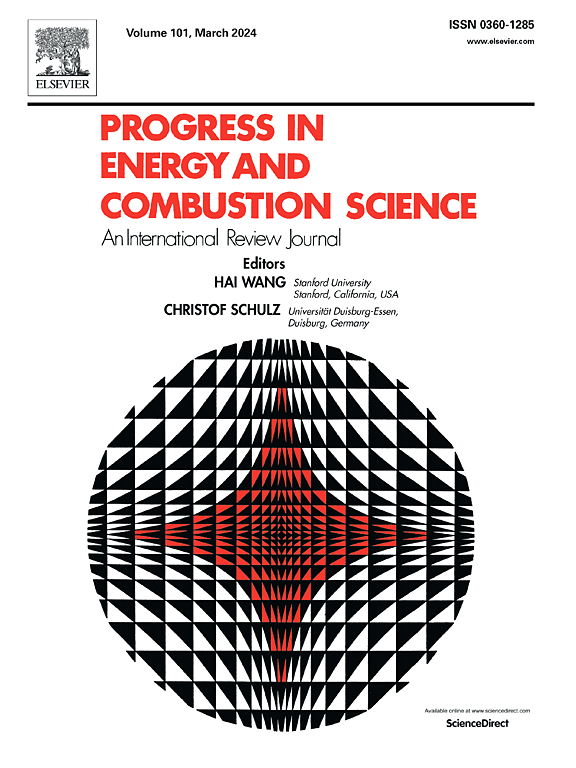氧化还原液流电池有机氧化还原活性物质的静态理论研究
IF 37
1区 工程技术
Q1 ENERGY & FUELS
引用次数: 0
摘要
摘要新型高效氧化还原液流电池(rfb)是目前大规模可再生能源存储的研究热点。进一步的开发需要改进氧化还原活性材料。量子化学方法允许筛选大量的氧化还原活性分子所需的分子性质。特别是在高通量研究中计算氧化还原电位。此外,对其他性质的计算,如溶解度或稳定性,以及对电子结构的深入分析,都是在较小数量的分子上进行的。本文综述了各种已知的活性物质分子及其在量子化学计算中的结果。我们将着重于电子结构方法,如密度泛函理论和基于波函数的方法。重要的理论结果提出并讨论了每一类考虑氧化还原活性分子。此外,还研究了各种量子化学方法,特别是关于它们的优点和局限性。本综述的另一个重点是比较理论预测结果与实验研究,并通过各种实例进行讨论。最后,对活性材料理论发展面临的挑战和趋势进行了展望。本文章由计算机程序翻译,如有差异,请以英文原文为准。
Static theoretical investigations of organic redox active materials for redox flow batteries
Abstract New efficient redox flow batteries (RFBs) are currently of great interest for large-scale renewable energy storage. Further development requires improvement of the redox active materials. Quantum chemical methods allow to screen large numbers of redox active molecules for required molecular properties. Especially the redox potentials are calculated in high-throughput studies. In addition, calculations of other properties such as solubility or stability and in-depth analysis of the electronic structure are performed on smaller number of molecules. This review provides an overview of various known classes of active material molecules and their results in quantum chemical calculations. We will focus on electronic structure methods such as density functional theory and wave function-based methods. Significant theoretical results are presented and discussed for each considered class of redox-active molecules. In addition, the various quantum chemical approaches are also examined, specifically with regard to their advantages and limitations. Another focus of this review is on comparing theoretically predicted results with experimental studies, which are discussed using various examples. Finally, further challenges and trends in the theoretical development of active materials are highlighted.
求助全文
通过发布文献求助,成功后即可免费获取论文全文。
去求助
来源期刊

Progress in Energy and Combustion Science
工程技术-工程:化工
CiteScore
59.30
自引率
0.70%
发文量
44
审稿时长
3 months
期刊介绍:
Progress in Energy and Combustion Science (PECS) publishes review articles covering all aspects of energy and combustion science. These articles offer a comprehensive, in-depth overview, evaluation, and discussion of specific topics. Given the importance of climate change and energy conservation, efficient combustion of fossil fuels and the development of sustainable energy systems are emphasized. Environmental protection requires limiting pollutants, including greenhouse gases, emitted from combustion and other energy-intensive systems. Additionally, combustion plays a vital role in process technology and materials science.
PECS features articles authored by internationally recognized experts in combustion, flames, fuel science and technology, and sustainable energy solutions. Each volume includes specially commissioned review articles providing orderly and concise surveys and scientific discussions on various aspects of combustion and energy. While not overly lengthy, these articles allow authors to thoroughly and comprehensively explore their subjects. They serve as valuable resources for researchers seeking knowledge beyond their own fields and for students and engineers in government and industrial research seeking comprehensive reviews and practical solutions.
 求助内容:
求助内容: 应助结果提醒方式:
应助结果提醒方式:


